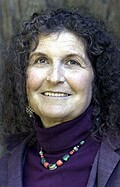In this webinar, CHE-Alaska presented a conversation with Dr. Arlene Blum, a biophysical chemist, author, mountaineer and research associate in chemistry at University of California at Berkeley and founder/director of the Green Science Policy Institute (GSPI).
GSPI collaborates with scientists from academia, government, business, and non-governmental organizations (NGOs) on research contributing to improved regulation and reduced use of per- and polyfluoroalkyl substances (PFAS).
This conversation focused on the work of GSPI on PFAS, a class of more than 12,000 persistent industrial chemicals, known as “forever chemicals.” PFAS are linked to health harms at low exposure levels, and many are bioaccumulative. Arlene and her team work to prevent PFAS pollution by publishing research, making policy recommendations, and educating business and policy makers.
The Institute’s scientific research and policy work with government and business has contributed to preventing the use of “Six Classes” of harmful chemicals including flame retardants and fluorinated chemicals in children’s products, furniture, electronics, and other products world-wide.
In 2019 the Institute launched PFASCentral.org, a curated source for news, science, policy, and opportunities related to PFAS. The website hosts an updated list of PFAS-free products and the PFAS Data Hub which provides access to PFAS data sources.
Featured Speaker
 Arlene Blum, PhD is Founder and Executive Director of the Green Science Policy Institute and a Research Associate in Chemistry at UC Berkeley. She is a biophysical chemist, author, and mountaineer. Blum’s research and policy work with the Institute has contributed to limiting the use of flame retardant, highly fluorinated, and other harmful chemicals in children’s sleepwear, furniture, electronics, and other products worldwide. Blum led the first American and all-women’s ascent of Annapurna I, one of the world’s most dangerous and difficult mountains; co-led the first women’s team to climb Denali; and completed the Great Himalayan Traverse. She is the author of Annapurna: A Woman’s Place and Breaking Trail: A Climbing Life.
Arlene Blum, PhD is Founder and Executive Director of the Green Science Policy Institute and a Research Associate in Chemistry at UC Berkeley. She is a biophysical chemist, author, and mountaineer. Blum’s research and policy work with the Institute has contributed to limiting the use of flame retardant, highly fluorinated, and other harmful chemicals in children’s sleepwear, furniture, electronics, and other products worldwide. Blum led the first American and all-women’s ascent of Annapurna I, one of the world’s most dangerous and difficult mountains; co-led the first women’s team to climb Denali; and completed the Great Himalayan Traverse. She is the author of Annapurna: A Woman’s Place and Breaking Trail: A Climbing Life.
 This webinar was hosted by the CHE-Alaska Partnership, which is coordinated by Alaska Community Action on Toxics (ACAT).
This webinar was hosted by the CHE-Alaska Partnership, which is coordinated by Alaska Community Action on Toxics (ACAT).
